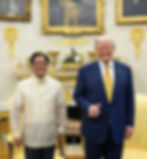
Optics Over Outcome: Marcos Jr.’s White House Visit and the Illusion of Strategic Gains
Jul 23, 2025
3 min read

When President Ferdinand “Bongbong” Marcos Jr. arrived at the White House this July, the scene evoked memories of Cold War-era statecraft—a “junior partner” welcomed back into the fold of American geostrategic designs. But beyond the formalities and orchestrated smiles, we are left with a difficult but necessary question: Did the Philippines truly gain anything of substance, or was this visit merely a solicitation of political legitimacy wrapped in patriotic ribbon?
Trade: A Tactical Concession, Not a Strategic Victory
The most headline-grabbing outcome of the visit was the announcement by former President Donald Trump of a 19% tariff on Philippine goods—a slight drop from the originally threatened 20%. The so-called “deal” is being spun by the Marcos administration as a triumph of negotiation. In reality, however, it is a symbolic fig leaf, not a breakthrough.
One cannot help but ask: Is this a negotiation, or a dictated reprieve?
Military Cooperation: Recycled Rhetoric and Renewed Dependency
On the military front, Marcos reaffirmed the Mutual Defense Treaty and the Enhanced Defense Cooperation Agreement (EDCA), allowing U.S. forces expanded access to Philippine bases. While cloaked in the language of deterrence, this move arguably increases the country’s vulnerability by tying its security policy to America’s global posture—particularly its rivalry with China.
There is little to suggest that the Philippines gained autonomous capability or strategic latitude from these agreements. The same promises of modernization, interoperability, and defense assistance have been made since the Aquino and Duterte administrations, yet the AFP still lacks basic air and naval defense systems.
What we are seeing is a deepening of dependency, not a strengthening of sovereignty.
Independent Foreign Policy: Slogan or Substance?
The Marcos administration claims to be pursuing an “independent foreign policy,” echoing the constitutional mandate to promote national sovereignty and avoid entangling alliances. Yet, this visit paints a different picture. The Philippines is, once again, caught in the gravitational pull of a global superpower, this time under the volatile shadow of a returning Trump presidency.
If independence means balancing relations with China, the U.S., ASEAN, and the EU, then this visit sent the wrong signal. It prioritized an exclusive bilateral alignment over multilateral engagement. Worse, it aligned Manila’s diplomatic timing with Trump's political campaign cycle—creating the impression that the Philippines is playing sidekick in America’s domestic theater.
Domestic Optics: Political Legitimacy Through Proximity
For Marcos, the White House visit bolstered his international image and offered a high-visibility moment that can be leveraged for domestic political capital. Standing beside a former U.S. president—even a controversial one like Trump—allowed him to project strength, stability, and global relevance to a Filipino electorate increasingly skeptical of his administration’s direction.
But legitimacy earned through proximity is fragile. It cannot substitute for reforms in governance, economic recovery, or human rights accountability. Nor can it conceal the rising costs of imported goods, the marginalization of local industries, and the creeping erosion of national self-determination.
What Was Missing: Transparency, Accountability, and Vision
Nowhere in the post-visit briefings did we hear about human rights, environmental protection, or labor mobility—areas where Filipinos in the U.S. and the diaspora have significant concerns. Nor was there clarity on how tariff reductions were calculated, how military site expansion will be governed, or how the Philippines plans to navigate its overlapping maritime and economic disputes with China.

These silences are not mere omissions; they are structural gaps that weaken the long-term value of international engagements.
A Call for Strategic Clarity and Sovereign Prudence
The Philippines must not confuse visibility with viability. A handshake in Washington may look good in press photos, but without strategic substance, it becomes a missed opportunity.
We must now demand from our leaders:
A comprehensive trade strategy that empowers Filipino industries and workers, not just appeases global powers;
A credible military modernization plan rooted in self-reliance and regional cooperation, not dependency;
A diplomatic policy that reflects true independence, engaging multiple partners without being drawn into proxy conflicts; and
Above all, transparency and consultation with the Filipino people about the real terms and costs of these bilateral arrangements.
History will not judge this visit by the approval it gained in Washington, but by what ordinary Filipinos gain—or lose—in its aftermath.







